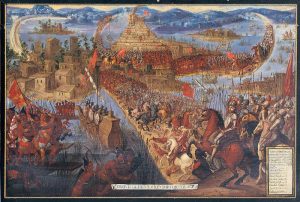Literature of Native American Perspectives and Discovery – De Vaca & The Pueblo Revolt of 1680
72 About the Pueblo Revolt and don Antonio de Otermin
Justin Siewierski & Simon Pierpont

The Pueblo Revolt took place in 1680. It was a rebellion of indigenous people that occurred in Santa Fe de Nuevo Mexico, present day New Mexico. The Pueblo Revolt, also known as Popé’s Rebellion, was a successful movement that resulted in the death of 400 Spaniards and also drove over 2,000 Spanish settlers out of the providence so the indigenous people could have their land back. Popé was a San Juan Indian who had been captured by the Spanish in 1670 and tried as a medicine man for “practicing sorcery.” After his release Popé organized a rebellion against the Spanish that consisted of 46 different pueblos (small towns) some over 200 miles apart. The combination of the 46 different pueblos created a militia of over 2,000 indigenous people compared to the Spanish’s 170 men with arms. The date set for the uprising was August 11, 1680. Popé dispatched runners to all the Pueblos carrying knotted cords. Each morning the leaders of the pueblos were instructed to untie one knot from the cord, and when the last knot was untied, that would be the signal for them to rise against the Spaniards in unison. With the capturing of two pueblo youth who were entrusted with the knots, the Spanish were able to find out when the revolt was going to occur. In order to combat the Spanish’s new knowledge, Popé ordered that the revolt take place on August 10th, a day earlier than originally planned. A total of 400 people were killed, including men, women, children, and 21 of the 33 Franciscan missionaries in New Mexico. Survivors fled to Santa Fe. By August 13, all the Spanish settlements in New Mexico had been destroyed and Santa Fe was besieged.
The letter, written by don Antonio de Otermin, recalls the Spaniards account of the revolt. Otermin was the Spanish governor on the northern province of New Spain, where present-day New Mexico and Arizona lie. In his short reign (1678-1682), Otermin gets into the middle of the revolt and tries to stop things from getting any worse. He describes trying to cope with the “Christian Indians” and how they were not up for compromising. The letter is sent to the Spanish majesty explaining the goings on during the revolt and how de Otermin acted under God.

